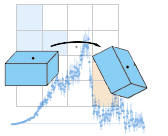
| HOME | PEOPLE | RESEARCH | ACADEMICS | TRAVEL/VISITORS | LINKS | CONTACT |

|
Web Mail
Mailing Lists
Computing Resources
Site Map
Temporal patterns for control and learning
Kristi Morgansen, Caltech, Control & Dynamical Systems
Monday, October 4, 199911:00 AM to 12:00 PM
Steele 102
The work presented lies at the intersection of two central areas of interest in systems research: learning theory and the control of nonlinear systems with nonintegrable constraints. In order to address the issues of control and learning in this context, the ideas of systems theory are extended from the more familiar linear domain to a nonlinear setting. We approach stabilization and tracking of drift-free nonholonomic integrators using approximate inversion where inputs are chosen to be combinations of linear feedback terms and frequency modulated sinusoidal terms. A given nonlinear system is then modeled as the cascade of a linear time-invariant system, a nonholonomic integrator, and another linear time-invariant system. Applying identification methods to the linear systems allows us to locally transform the nonlinear system into a nonholonomic integrator. Organizing the nonlinear effects in terms of the structure of the Lie algebra associated with the control vector fields allows us to develop a general method of identification.
Using this cascade approach to system representation, we investigate second-order forms of the nonholonomic integrator. We show how the approximate inverse can be extended to these second-order systems to produce tracking and stabilization. As part of this work, we relate the asymptotic stabilization results based on approximate inversion to the optimal controls for the repositioning problem. By comparing cascade response to linear transfer function response using stochastic methods, we evaluate the behavior of the cascade of an approximate inverse and a second-order nonholonomic system.
|
©2003-2011 California Institute of Technology. All Rights Reserved webmaster |
|